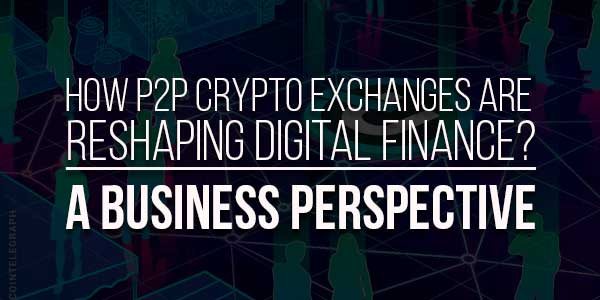
Peer-to-peer (P2P) cryptocurrency exchanges are becoming a significant force in developing digital finance as blockchain technology continues to upend traditional finance. P2P crypto exchange development presents a decentralised alternative to standard trading platforms by enabling direct transactions between users without relying on central intermediaries. From improved financial inclusion to decreased costs and enhanced privacy, these platforms offer a wide range of benefits for individuals and business stakeholders alike.
This article explores how peer-to-peer cryptocurrency exchanges are changing the financial landscape and the implications for businesses.
Table of Contents
What Is A P2P Crypto Exchange?
A peer-to-peer (P2P) cryptocurrency exchange is a decentralised marketplace that links cryptocurrency buyers and sellers directly. P2P platforms enable direct user-to-user transactions, as opposed to centralised exchanges (CEXS), which serve as middlemen. To maintain security and transparency, they frequently use escrow systems or smart contracts.
Key Characteristics Of P2P Exchanges Include:
- Decentralized control
- Enhanced privacy and anonymity
- Lower transaction fees
- Flexibility in payment methods
LocalBitcoins, Paxful, and Bisq are well-known P2P platforms.
The Rise of P2P Crypto Exchanges:
Several trends are driving P2P cryptocurrency exchanges’ growing popularity:
- Privacy Concerns: Centralised platforms require extensive user data for KYC and AML compliance. P2P platforms offer more anonymity.
- Regulatory Pressures: In countries with strict financial regulations or crypto bans, P2P exchanges provide a workaround.
- Global Financial Inclusion: P2P exchanges open doors for unbanked populations to access digital finance using local payment methods.
- Decentralisation Movement: The broader Web3 and DeFi movements emphasise user autonomy and transparency.
Business Advantages Of P2P Exchanges:
Investing in or creating a P2P exchange has various strategic benefits for businesses.
- Lower Operational Costs: With no need to maintain vast custodial infrastructures, P2P applications run more efficiently and cost-effectively.
- Faster Market Entry: Platforms tailored to a particular region or specialisation can be launched by businesses with little difficulty.
- Scalability: Since operations and liquidity are community-driven, decentralised methods scale more naturally.
- Revenue Models: Transaction fees, premium listings, advertising, and value-added services are examples of monetisation potential.
Key Features Of Successful P2P Platforms:
The following characteristics are often provided by prosperous P2P cryptocurrency exchanges to draw users and effectively compete:
- Multi-layered Security: Escrow services, reputation systems, two-factor authentication (2fa).
- Flexible Payment Methods: Bank transfers, e-wallets, mobile money, and even cash payments.
- Dispute Resolution Mechanisms: Moderators or smart contracts to resolve trade disputes.
- User Ratings & Reviews: Builds trust and credibility within the community.
- Multi-Currency Support: Expands user base by supporting diverse digital and fiat currencies.
Use Cases and Industry Applications:
Retail cryptocurrency traders are not the only users of P2P exchanges. Companies in a variety of industries are using them:
- Remittance Services: Providing low-cost cross-border payments without intermediaries.
- Tokenised Asset Markets: Allowing users to trade real estate tokens, NFTS, or utility tokens directly.
- Crowdfunding Platforms: Launching fundraising campaigns in a decentralised manner.
- Local Community Banks: Supporting local economic systems with alternative currencies.

Regulatory Challenges and Compliance:
Operating a P2P exchange comes with its share of regulatory hurdles:
- Lack of Clear Frameworks: Many jurisdictions still lack specific guidelines for P2P exchanges.
- AML & KYC Requirements: Balancing user privacy with compliance is complex.
- Licensing: Depending on the region, licenses may be required even for non-custodial platforms.
To create platforms that conform to international standards while preserving the decentralised philosophy, businesses must collaborate closely with legal counsel.
Security and Trust:
Because users frequently engage with unknown counterparties in P2P trades, security is crucial.
Sturdy platforms are used
- Escrow protections for all trades
- Smart contract audits
- Real-time fraud detection
- User verification and blacklisting systems
Creating a safe platform improves long-term viability and brand reputation in addition to protecting users.
Economic Impact and Financial Inclusion:
P2P exchanges contribute to global economic inclusion by:
- Serving unbanked and underbanked populations
- Offering access to global currencies and financial tools
- Reducing reliance on volatile or restricted local currencies
These platforms create new economic opportunities and democratise money in areas that were previously shut out of traditional institutions.
Entrepreneurial Opportunities in P2P Exchange Development:
The growth of P2P exchanges offers blockchain developers and digital entrepreneurs the following beneficial opportunities:
- Niche Market Platforms: Catering to specific industries, regions, or user groups.
- White-Label Solutions: Providing turnkey P2P exchange software for startups.
- Layer-2 Integrations: Enhancing scalability and speed via layer-2 blockchain solutions.
- DeFi and Web3 Interoperability: Creating cross-platform tools and wallets.
Case Study: Paxful
By concentrating on developing countries like Africa and Southeast Asia, Paxful, a well-known P2P cryptocurrency exchange, has expanded dramatically. With more than 350 payment options and a focus on financial literacy, Paxful is a prime example of how inclusive, localised tactics can grow a user base and a successful business model on a global scale.
Future Outlook: What Lies Ahead:
The future of P2P exchanges is bright, with ongoing advancements in:
- Smart contract automation
- Decentralised identity systems (DIDS)
- AI-based fraud detection
- Integration with traditional banking infrastructure
As blockchain use expands and financial systems digitise further, P2P exchanges will likely become a standard component of global financial infrastructure.
Conclusion:
Peer-to-peer cryptocurrency exchanges are a paradigm shift in the way financial systems can function, going beyond simple trading platforms. P2P exchanges enable enterprises and individuals to engage in the digital economy on their terms by reducing costs, increasing accessibility, and decentralising control. The business case for using P2P cryptocurrency exchange technology is stronger than ever, with startups hoping to upend local banking and companies looking for scalable blockchain solutions.
The moment has come for forward-thinking companies and entrepreneurs to investigate, develop, and make investments in the future’s decentralised financial system.

 About the Author:
About the Author:












Be the first to write a comment.